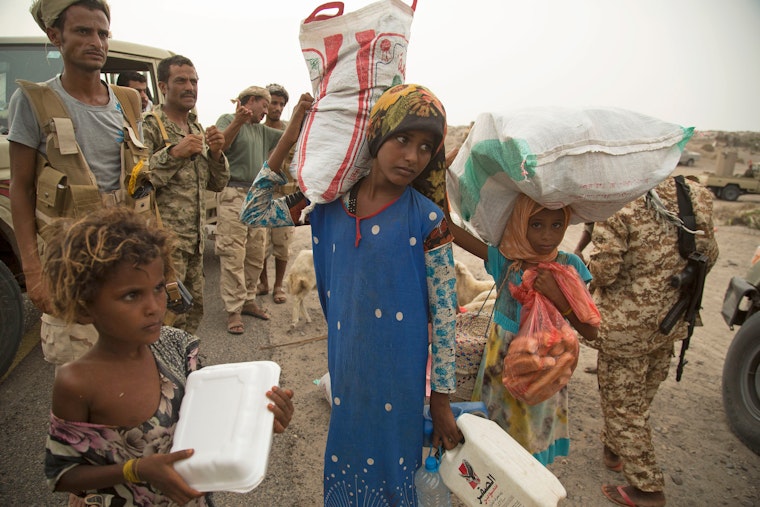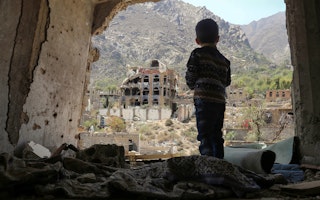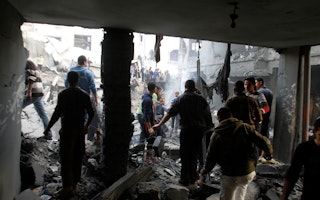Q&A: Yemen’s Humanitarian Catastrophe Demands Action

For years, Yemen has been devastated by an armed conflict between Houthis and forces loyal to the Hadi government. A coalition led by Saudia Arabia and the United Arab Emirates is supporting forces loyal to the government. Recently, Open Society’s Soheila Comninos spoke to the Mwatana Organization for Human Rights’ Radhya al-Mutawakel about what has made this conflict so destructive.
What is it like in Yemen now?
Death surrounds us. I don’t know anyone who has not been touched by this conflict.
The Yemeni people face almost unprecedented human suffering. One in three Yemenis is on the brink of famine. We faced the worst cholera outbreak in modern history. Yemen now is, according to UN experts, the worst humanitarian disaster in the world. It is a human-made disaster, created by warring parties who have committed violation after violation.
And it is all so senseless, so preventable. We live in a land torn to shreds by a war largely fueled by outside forces.
Currently, the port city of Hodeidah is under assault by the Saudi-led coalition, which backs the government. We are very concerned, not just for the city’s 600,000 residents, but also because about 75 percent of Yemen’s aid—and almost all of its commercial food shipments—go through the port.
Have war crimes been committed?
Our on-the-ground investigations show this war is especially brutal in the indiscriminate way that civilians have been attacked. International law is quite clear: warring parties must take measures to avoid civilian loss of life as they engage in their campaigns. None of them have.
In fact, the Saudi-led coalition has bombed targets such as schools, residential areas, and markets indiscriminately. Thousands have been killed and injured. Many of them are women and children.
The Houthis, meanwhile, similarly target civilians. They shell major cities indiscriminately, including Taiz, Yemen’s third-largest city.
Both parties have also used starvation as a war tactic and denied access to critically needed humanitarian aid. All the combatants are involved in other serious violations—such as child recruitment, detentions, torture, and enforced disappearances.
We need some form of accountability. We are hopeful that the group of experts established by the Human Rights Council last year will help. The mandate of this group should be extended and strengthened. This is a proposal the United States and its allies must support.
What can be done to help the people of Yemen?
To start, the United States, the United Kingdom, France, Italy, and others should suspend arms sales to Saudi Arabia and the United Arab Emirates. The United States and its allies claim to be leading voices in efforts to enforce international norms and minimize civilian deaths in war. Yet it is these countries’ bombs which are killing my countrymen, women and children.
The United States and its allies can’t be in favor of enforcing international law only when it is in their strategic interests. It is this sort of hypocrisy which fuels anger towards the West and undermines the power of standing up for human rights.
We are calling on all sides in the conflict to stop targeting civilians, and to recognize it as a mistake when civilians are killed. Offering apologies and reparations—and committing to concrete steps that provide accountability and justice—can help end the cycle of violence.
Of all the countries in the Middle East, extremist groups like al-Qaeda have the strongest foothold in Yemen. Why?
The war has created ideal conditions for extremist groups to flourish. There are many reasons for this. Many extremist groups have spent much of the war building a powerbase in local areas.
To reverse the trend, the Saudi-led coalition has to abandon an approach which assumes “the enemy of my enemy is my friend.” Supporting these militant groups will create problems which will likely take many years for Yemen to fix.
Also, U.S. drone strikes, aimed at extremists—which have significantly increased under President Donald Trump—should be conducted in a more transparent manner. Far too often, credible reports of civilian deaths by drone strikes are not investigated adequately and not reported on in a way that leaves the victims with a sense of justice and closure.
Donald Rumsfeld, the former U.S. secretary of defense, once asked in the context of the Iraq war: “Are we creating more terrorists than we are killing?” If U.S. leaders asked the same question about their operations in Yemen, they would be disturbed by the answer.
How could the United States change the way it directs drone strikes?
A simple answer: release the “kill list.”
One of the demands that survivors of drone strikes often ask for is a list of wanted people. A list that is clear and available to the public would allow them to avoid targeted individuals, protect their children and not allow U.S. targets to take refuge in their areas.
A kill list is just one step the United States could take to minimize civilian harm as a result of air strikes. The rules of engagement should be written in a way that takes every possible precaution to ensure that no regular people—also known as noncombatants—are killed by U.S. drones.
If a civilian is killed or injured, we need a systematic, transparent investigation, and the United States should recognize the injustice by providing an apology, compensation, and/or reparations.
Say more about why it is in the strategic interest of the United States to operate a more transparent, accountable program of air strikes?
The way the drone program is currently carried out works, in some ways and counterintuitively, to the advantage of extremist groups. They thrive in an environment of uncertainty and insecurity. Who would not be worried if their children can be shot at—without recourse and at any time—from a flying, remote-controlled war plane?
Several years ago, one of our research teams was in a part of Yemen where drone strikes are common. We were there to investigate civilian deaths as a result of these strikes. We overheard the families of some of the people who had been killed talking about kidnapping us. Their reasoning was: we were associated with the Open Society Foundations, an American group, so holding us might get them the answers they craved about why their loved ones were targeted by drones.
We were not kidnapped, but the moment shows how the families of victims—many of whom are poor farmers who have waited so long for an acknowledgment for the harm they have suffered—begin to consider violent solutions to their problems.
The Mwatana Organization for Human Rights is a grantee of the Open Society Foundations.


